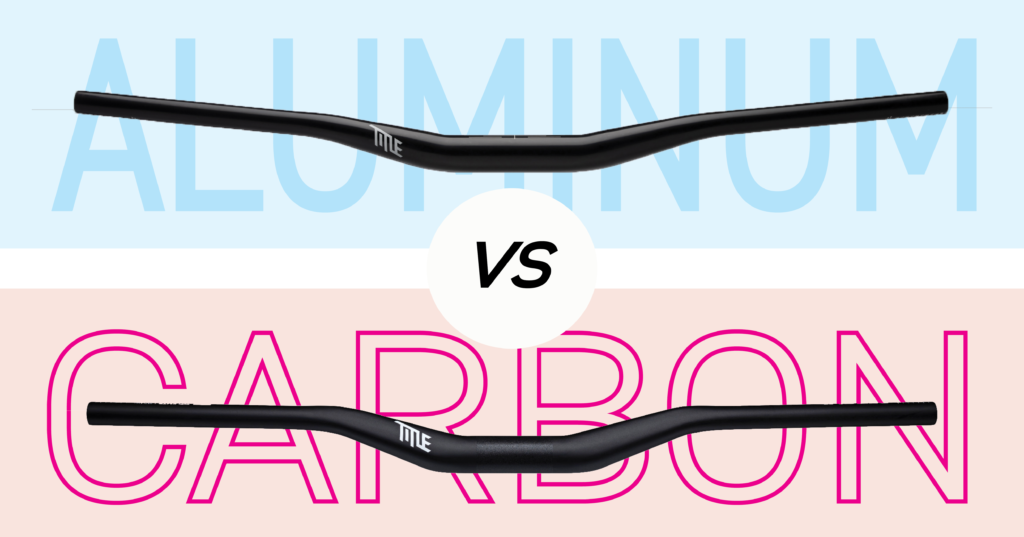Aluminum vs. Carbon MTB Handlebars – Advantages & Disadvantages
When choosing a mountain bike handlebar one of the options you will come across is whether to go with aluminum or carbon fibre. So what material is better? That depends on what you are looking for. In the following article we are going to go over the advantages and disadvantages of aluminum and carbon handlebars so you can make the most informed decision when buying your next bar.
Aluminum Handlebar Advantages
- Affordability: Aluminum handlebars are generally more affordable than carbon fiber handlebars, making them a good option for riders on a budget. By comparison, a Title MTB aluminum handlebar retails for $109.95CAD, while a Title MTB carbon handlebar retails for $279.95CAD.
- Durability: Aluminum is a very durable material and can withstand a lot of abuse without cracking or breaking. This makes aluminum handlebars a good choice for riders who ride aggressively or in rough terrain.
- Stiffness: Aluminum handlebars are stiffer than carbon fiber handlebars, which can provide better control and responsiveness when riding.
- Repairability: If an aluminum handlebar does get damaged, it can often be repaired rather than needing to be replaced, which can save the rider money.
- Availability: Aluminum handlebars are widely available and can be found in a variety of shapes and sizes, making it easy for riders to find a handlebar that suits their preferences.
Aluminum handlebars are a good choice for riders who are on a budget and prioritize durability, as well as those who want a stiff handlebar for better control and responsiveness.
Aluminum Handlebar Disadvantages
- Weight: Aluminum handlebars are generally heavier than carbon fiber handlebars, which can make the bike feel less nimble and affect acceleration.
- Vibration: Aluminum handlebars can transmit more vibration to the rider's hands, which can cause fatigue and discomfort on longer rides.
- Limited Shock Absorption: Aluminum handlebars don't absorb shock as well as carbon fiber handlebars, which can result in more jarring impacts on rough terrain.
- Corrosion: Aluminum can corrode over time, especially in areas with high humidity or saltwater exposure, which can weaken the handlebar and compromise its integrity.
- Limited customization: Aluminum handlebars are generally less customizable than carbon fiber handlebars, with fewer options for shapes and sizes.
Overall, riders who prioritize weight and shock absorption may prefer carbon fiber handlebars, while those who prioritize durability and stiffness may prefer aluminum handlebars. Riders who want to reduce vibration may want to consider adding grip tape or gel padding to their aluminum handlebars.
Carbon Handlebar Advantages
- Weight: Carbon fiber is a lighter material than aluminum, which can reduce the overall weight of the bike and make it feel more nimble and easier to handle.
- Shock Absorption: Carbon fiber handlebars absorb more shock and vibration than aluminum handlebars, which can result in a smoother and more comfortable ride, especially on rough terrain.
- Customization: Carbon fiber handlebars are highly customizable, with a wide range of shapes, sizes, and flex options available to suit different riding styles and preferences.
- Strength-to-Weight Ratio: Carbon fiber is stronger than aluminum relative to its weight, which can provide better strength and durability without adding extra weight to the bike.
- Aesthetics: Carbon fiber handlebars have a sleek, modern look that many riders find appealing.
Carbon fiber handlebars are a good choice for riders who prioritize weight, shock absorption, and customization. They can also provide a stylish upgrade to the look of the bike. However, they do tend to be more expensive than aluminum handlebars, and they can be more prone to damage from impacts or over-tightening.
Carbon Handlebar Disadvantages
- Cost: Carbon fiber handlebars are generally more expensive than aluminum handlebars, which can be a significant investment for riders on a budget.
- Durability: Carbon fiber handlebars can be more fragile than aluminum handlebars and are more susceptible to damage from impacts or over-tightening. Cracks or other damage to the handlebar can compromise its structural integrity and make it unsafe to use.
- Repairability: Carbon fiber handlebars can be more difficult to repair than aluminum handlebars. In many cases, damaged carbon fiber handlebars will need to be replaced rather than repaired.
- Fatigue: Carbon fiber handlebars can transmit less vibration to the rider's hands, which can reduce fatigue on long rides. However, some riders may find that the lack of vibration feedback makes it more difficult to judge the terrain and control the bike.
Our Take
Overall, riders who prioritize weight, shock absorption, and customization should go with carbon fiber handlebars. However, riders should be prepared to invest more money and take extra care to avoid damage to the handlebars. Riders who prioritize durability and affordability would be better off going with aluminum handlebars instead.
Looking to upgrade your handlebar? Shop our full selection of mtb handlebars now! We offer free shipping on all orders over $149CAD and all orders are processed and shipped within 24 business hours. Spend less and ride the best with TBS Bike Parts!
Related Articles
HOW TO CHOOSE THE RIGHT MTB HANDLEBAR

